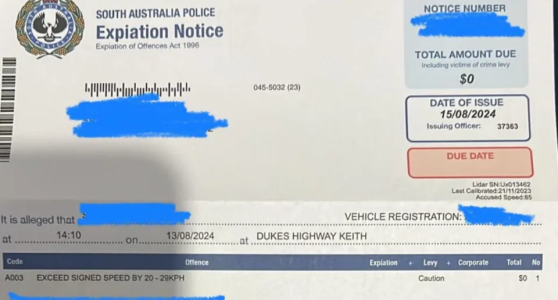How Aussie driver turned $1,028 fine into $0—police officer spills insider tips
By
- Replies 9
Navigating the roads can be tricky, and for many of us over 60, we've seen our fair share of changes to traffic laws and enforcement over the years.
But one South Australian driver's recent experience has left many scratching their heads—and it might just offer a glimmer of hope for those of us who dread the sight of a speeding ticket.
The driver was caught speeding, going 20 to 29 kilometres per hour over the limit.
Ordinarily, such an offence would result in a hefty $1,028 fine and five demerit points.
However, to their surprise, the fine arrived in the mail for $0. Yes, you read that correctly—zero dollars.
A South Australia Police spokesperson clarified this peculiar turn of events, explaining that a financial penalty isn't necessary in some instances.
'Police have used discretion in these circumstances and cautioned the offending driver for exceeding speed,' they said.
'The issuance of the notice is a formal way of recording the caution and is not a faulty fine.'
The driver had been travelling on Dukes Highway when they encountered a speed limit change from 80km/h to 60km/h and admitted to slowing down 'very late'.
Although they were told to expect a fine, the $0 infringement left them baffled.
But how can you, as a driver, increase your chances of receiving a caution instead of a fine?
A former police officer illuminated the matter, noting that a driver's record and attitude are the most significant factors in determining the outcome of a traffic stop.
'Good record + don't lie = excellent chance of a warning. Traffic (police) are less predictable,' they advised.
However, they also cautioned that once you've received a break, it's recorded in the system, and you might not be so lucky next time.
The story sparked a conversation among drivers from other states, with some expressing envy at South Australia's seemingly lenient approach.
An interstate driver commented, 'A caution notice for 20-29kph over the limit? You guys in SA are living in heaven,'
Meanwhile, a Queenslander lamented their state's stricter penalties.
New South Wales Police confirmed that drivers can be given speeding warnings, which are sent via mail but don't resemble a fine.
On the other hand, the Queensland Police Service had less encouraging news for drivers, stating that such leniency is 'not a thing up in Queensland.'
In contrast, a driver in New South Wales was fined $2764 and suspended his license for six months after being caught driving 55 km/h over the speed limit.
He argued that his speeding was due to a desperate need to use the restroom. You can read more about it here.

Have you ever received a caution instead of a fine? What are your tips for dealing with traffic stops? Share your stories and advice in the comments below.
But one South Australian driver's recent experience has left many scratching their heads—and it might just offer a glimmer of hope for those of us who dread the sight of a speeding ticket.
The driver was caught speeding, going 20 to 29 kilometres per hour over the limit.
Ordinarily, such an offence would result in a hefty $1,028 fine and five demerit points.
However, to their surprise, the fine arrived in the mail for $0. Yes, you read that correctly—zero dollars.
A South Australia Police spokesperson clarified this peculiar turn of events, explaining that a financial penalty isn't necessary in some instances.
'Police have used discretion in these circumstances and cautioned the offending driver for exceeding speed,' they said.
'The issuance of the notice is a formal way of recording the caution and is not a faulty fine.'
The driver had been travelling on Dukes Highway when they encountered a speed limit change from 80km/h to 60km/h and admitted to slowing down 'very late'.
Although they were told to expect a fine, the $0 infringement left them baffled.
But how can you, as a driver, increase your chances of receiving a caution instead of a fine?
A former police officer illuminated the matter, noting that a driver's record and attitude are the most significant factors in determining the outcome of a traffic stop.
'Good record + don't lie = excellent chance of a warning. Traffic (police) are less predictable,' they advised.
However, they also cautioned that once you've received a break, it's recorded in the system, and you might not be so lucky next time.
The story sparked a conversation among drivers from other states, with some expressing envy at South Australia's seemingly lenient approach.
An interstate driver commented, 'A caution notice for 20-29kph over the limit? You guys in SA are living in heaven,'
Meanwhile, a Queenslander lamented their state's stricter penalties.
New South Wales Police confirmed that drivers can be given speeding warnings, which are sent via mail but don't resemble a fine.
On the other hand, the Queensland Police Service had less encouraging news for drivers, stating that such leniency is 'not a thing up in Queensland.'
In contrast, a driver in New South Wales was fined $2764 and suspended his license for six months after being caught driving 55 km/h over the speed limit.
He argued that his speeding was due to a desperate need to use the restroom. You can read more about it here.
Key Takeaways
- A South Australian driver received a $0 fine in the mail for speeding, which could generally result in a $1,028 fine and five demerit points.
- South Australia Police explained that the $0 fine represents a formal caution, and discretion was used not financially to penalise the driver.
- A former police officer suggested that a driver's record and attitude can significantly influence whether they receive a ticket or a warning.
- The leniency found in South Australia regarding speeding cautions contrasts with stricter responses in other states, such as Queensland.
Last edited by a moderator:








